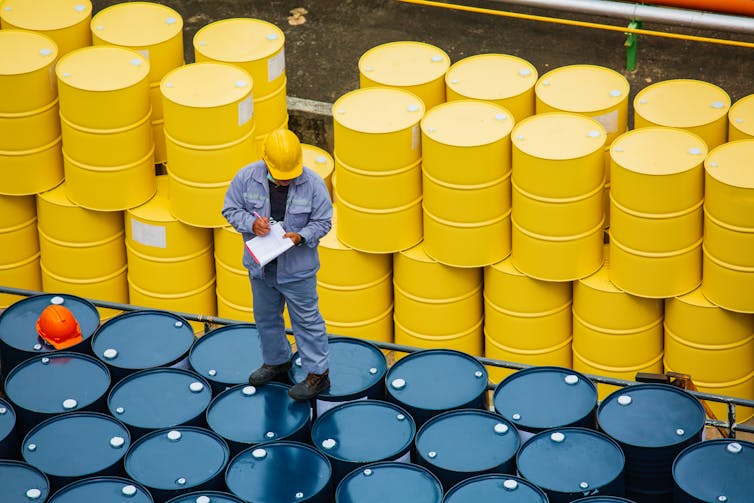
Liz Truss’s government is expected to fast-track permits for new North Sea gas fields to boost fossil fuel extraction on the UK’s continental shelf.
In a recent letter, the Committee on Climate Change (an expert body that advises the UK government) warned the new prime minister that increasing gas production may shore up supplies this winter, but there is not enough gas to ease the high prices set on the global market or cut the UK’s dependence on gas imports.
More importantly, continuing to explore for new oil and gas reserves and expanding drilling conflicts with the UK’s commitments to limit global warming to well below 2°C and reach net zero emissions by 2050. To assuage these concerns, the government recently confirmed the structure of what it calls its climate compatibility checkpoint: a series of tests designed to check if new oil and gas licenses jeopardise emission reduction targets.
The checkpoint was first proposed in 2021 as part of the North Sea transition deal, an agreement between the UK government and the oil and gas sector to work together to meet these targets. It led the world in terms of how comprehensively it assessed the climate consequences of new fossil fuel projects via six tests. But the final version appears to have reduced all this to a formality. Only three tests remain, and each seems designed to wave through new rounds of oil and gas exploration and production.
As researchers who study how the transition from fossil fuels can benefit workers and communities, we believe the government’s tests will do very little to address the country’s climate goals – or move the UK away from expensive gas.
What’s in the checkpoint?
The North Sea Transition Authority (NSTA) is responsible for issuing licenses for companies to look for and extract offshore oil and gas. It follows a strategy of “maximising economic recovery”, in other words, maximising the profitable production of oil and gas from the North Sea. A parallel commitment to ensuring the oil and gas industry reaches net zero in 2050 was added to this strategy in 2021, but it contains no mechanism for assessing how to reconcile this with exploiting the UK’s oil and gas reserves.
Globally, the production plans of all governments promise to yield double the amount of fossil fuel than can be safely burned to remain below 1.5°C by 2030, according to a report led by the UN Environment Programme. The UK government accepts that “producers globally will ultimately need to leave some oil and gas in the ground in order to meet global climate targets”. It appears this will not include producers in the UK though, as the checkpoint rejects curtailing oil and gas production.
The government’s strategy appears to be reducing demand for fossil fuels by increasing the deployment of technologies capable of generating and running on renewable electricity, like offshore wind farms, electric vehicles and heat pumps. But ignoring measures to restrict oil and gas production makes reducing demand much more difficult, as it keeps rigs and pipelines in place which lock in carbon emissions and undermine attempts to switch to low-carbon alternatives.

The checkpoint does not have a threshold that would indicate a proposed oil and gas licensing round has passed the test, or any requirement to pass all three tests. The first test asks whether new oil and gas developments would reduce operational emissions (those that occur while a company is looking for oil and gas and extracting it). Companies are already obliged to cut these emissions under the transition deal, essentially duplicating an existing (and notably lax) requirement.
The second test assesses how the UK oil and gas industry compares to those in other countries but does not require any specific improvement for the test to be passed.
The third test asks “whether the fuel being exported is tied to lower emissions than that of other producers”. Even if the UK became a net exporter of oil and gas (which is not expected), the checkpoint would effectively leave it up to the government to decide whether a new North Sea oil and gas project is compatible with its commitments to tackle climate change. In Monopoly parlance, it’s a get-out-of-jail-free card.
What’s left out?
In the draft checkpoint, the government asked a range of experts how scope 3 emissions could be measured and monitored. These are the emissions that result from burning the oil and gas – in cars and gas boilers, for example – in the UK or abroad if exported.
They are by far the largest emissions associated with the oil and gas industry. Despite several proposed methods, and the government’s acknowledgement that it would be possible to calculate the UK’s scope 3 emissions, the checkpoint does not include them among the final three tests.
The same fate met the test on whether new fields align UK oil and gas extraction with closing the global production gap – the gulf between how much fossil fuels countries plan to produce versus the levels that are needed to be consistent with limiting warming to 1.5°C.
The government also scrapped the test requiring the oil and gas industry to invest in what it calls “energy transition technologies”, such as hydrogen or carbon capture and storage, abandoning any ideas that future oil and gas licensing will be contingent on companies committing to permanent CO₂ removal.
The slimmed-down checkpoint is designed to inform the decisions of the NTSA, not bind them. As a result, there is no way to challenge in court a decision to open a new oil and gas licensing round, as long as the NSTA can demonstrate that it considered the information under the checkpoint.
This is a problem given that in the past two years, UK courts dismissed challenges to new oil and gas projects both under environmental impact assessment regulations and the NSTA’s maximising economic recovery strategy, citing the absence of regulatory requirements to consider emissions beyond those that occur during production.
The UK’s oil and gas checkpoint is not a meaningful test for ensuring future oil and gas licensing meets the country’s climate targets. This makes the risk of a chaotic transition from fossil fuels more likely, one where climate targets fall by the wayside and energy workers are left to face an uncertain future alone.
Tavis Potts receives funding from UKRI, and a portfolio of charity, civil society and government funding sources.
Daria Shapovalova works with and has received research funding from AHRC, British Academy, and a number of civil society organisations.
This article was originally published on The Conversation. Read the original article.







